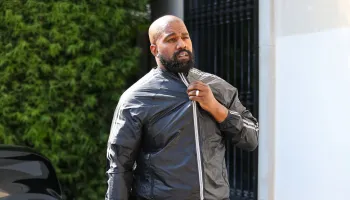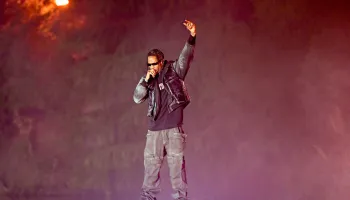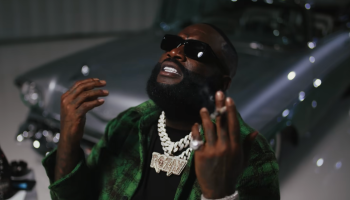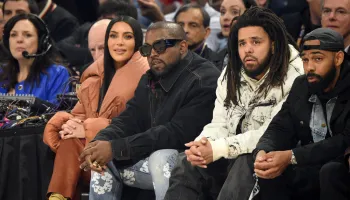Being a minority is challenging. Having to learn how to articulate your perspective in a way that the mainstream understands – balancing that with not caring what anyone thinks – can be draining. But for Khalil Ismail, an African-American rapper from Baltimore, born to Islamic proselytes, being all the way outside the box is the only way to survive.
HipHopWired: On “Hip Hop,” one of your lead singles from your new album The Calm Before the Storm, you go in on our beloved genre saying: “It’s you who got the power/it’s you who got the fame… See now you got the money, so no excuse remains/You say the ‘hood is evil, why don’t you help it change?/You say they hurt your mommy, but you defile her name.” What is that about?
Khalil Ismail: Ever since I can remember, I was sitting listening for some Hip-Hop lyrics. Rhyming always piqued my interest, so Hip-Hop always captivated me. The KRS Ones and Commons made want to get the knowledge, Biggies and Pacs made you want your guns cocked… Back then I felt like it was more balance. [The song “Hip Hop”] It’s just saying everybody listens to you [Hip-Hop], now you have everybody’s ear, we’ve gone through the stage of glorifying what you’ve been through, now what you gon’ do next?
HipHopWired: So basically taking issue with the mainstream. Do you think the mainstream has the potential to shift focus, or is it by definition a place of materialism and misogyny?
Khalil Ismail: Not only do I think it has the potential to shift focus, I think it has to at some point. In the ‘90s it was Lauryn Hill. She was a mainstream artist that everybody listened to, that for the most part everybody loved. Bob Marley was a mainstream artist. These things tend to go in cycles.
HipHopWired: Both of those artists definitely did not shy from singing about God-related things. Similarly, you reference your faith in Allah on almost every track of The Calm Before the Storm. What is “the storm,” is it something religious?
Khalil Ismail: There’s basically a storm moving in all of our lives depending on where we are, and it doesn’t matter who we are, we all have that storm coming. If you’re a superstar and you already have a lot of money, you know, it could be the recession, it could be you losing all of your money and then what are you going to do? If you are comfortable in your house, then it could be the next natural disaster. The storm could be you dying. And so the message [of the album] is, because we all inevitably face change in our life as we know it right now, have we thought about it, and mentally and spiritually are we prepared for that change?
HipHopWired: Speaking of change, you wrote your race relations song “Wake Up” around the time of President Obama’s nomination. Since then, Obama’s been in office and you’ve been on a nationwide tour; do you think we live in a post-racial America?
Khalil Ismail: I definitely don’t think it’s a post-racial America… In a song like “Wake Up,” what I realize is that – [and] people who have spent anytime around other races and different countries and things – this is not an African American versus White American thing alone, this is light-skinned Puerto Rican versus darker skinned Puerto Rican. This is something obviously inherent in human beings that unless it’s pinpointed and fought against, it’s going to happen.
HipHopWired: You’ve done some relationship building of your own. You performed in London at the Global Peace and Unity Conference where you met South African singer Zain Bhikha and the two of you appear in the video for “Freedom Will Come [Palestine]” featuring Abdul Malik and L Debois. Do you think peace can be achieved in the Middle East?
Khalil Ismail: Honestly, I don’t know. If there’s a fair division in the property, possibly. But I mean, you gotta think about that this is something that’s been going on for probably 1000 years now. So really at this point only inspiration from God can bring peace to that area, but in the meantime, when you see an injustice, as a Muslim especially, if someone asks you to help out… [That video] that’s just my little way of helping to bring light to the issue.
HipHopWired: Do you feel like your music helps to debunk common perceptions of Hip-Hop and Islam?
Khalil Ismail: Yeah, definitely, I mean, I’ve had many people tell me before, especially older people, that they really didn’t like Hip-Hop and they didn’t realize Hip-Hop could sound like that… On the Islam tip, I wouldn’t say so much it’s debunking perceptions. I will say that I have had a number of actual Christian preachers tell me that they really like my album and I’ve actually heard one played some of my tracks in his church.
HipHopWired: Diplomatic relations.
Khalil Ismail: Yeah.
HipHopWired: The music industry has for a while now been experiencing a decline in sales, what gives you the courage to not go the mainstream route?
Khalil Ismail: Probably faith in God, one. Whether they tend to be spiritual people or not, I get too much positive feedback. It’s harder now for the person that’s coming up and trying to get into the industry and they don’t have a connect or someone to mold them like a Lil’ Wayne and Drake situation. Unless you have that type of connection, I would say it’s even harder if you don’t stand out in terms of your content. We’re now in the industry where your name is less and the way that the industry uses you is such that if you go down, if the next ‘Young Dro’ goes down, they’ll get the next ‘Young Dre’ and really the song won’t change. That’s the difference between the industry of today and yesterday, like if you took a Tupac song and say, if Snoop or another mainstream artist did it, it wouldn’t sound the same.
Hear Khalil Ismail’s The Calm Before the Storm free at KhalilMusic.com.
“Hip-Hop”















